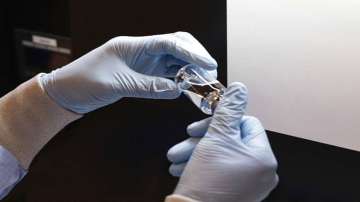Remdesivir improves time to recovery in COVID-19 patients: Study
Remdesivir, the antiviral under clinical trials for treatment against novel coronavirus infection, is superior to the standard of care given to COVID-19 patients, according to a new study.

Remdesivir, the antiviral under clinical trials for treatment against novel coronavirus infection, is superior to the standard of care given to COVID-19 patients, according to a new study. The analysis, published in the New England Journal of Medicine, is based on data from the Adaptive COVID-19 Treatment Trial (ACTT), sponsored by the National Institute of Allergy and Infectious Diseases (NIAID) in the US.
In the randomised, controlled trial, clinicians enrolled adults hospitalised with COVID-19 who showed infection in the lower respiratory tract and suffered from moderate to severe disease.
The researchers, including those from the New York University in the US, found that remdesivir was most beneficial for hospitalised patients with severe disease requiring supplemental oxygen.
"Preliminary results of this trial suggest that a 10-day course of remdesivir was superior to placebo in the treatment of hospitalised patients with COVID-19," the scientists wrote in the study.
Findings about benefits in other patient subgroups were less conclusive in this analysis, they said.
The study began on February 21, 2020 and enrolled 1,063 participants in 10 countries, with patients providing informed consent to participate, the researchers said.
They said the patients were randomly assigned to receive local standard care and a 10-day course of the antiviral remdesivir intravenously, or local standard care and a placebo.
According to the study, the trial was double-blind, meaning neither investigators nor participants knew who was receiving remdesivir or placebo.
The preliminary findings, based on an analysis of 1059 participants, noted that patients who received remdesivir had a shorter time to recovery than those who received placebo.
"We are awaiting final visits, data entry, monitoring, and data lock for the last of the 1063 patients enrolled, after which an update of the results will be provided," the researchers noted in the study.
The study defined recovery as being discharged from the hospital or being medically stable enough to be discharged from the hospital.
The median time for this, the researchers said, was 11 days for patients treated with remdesivir compared with 15 days for those who received placebo.
According to the study, the clinicians tracked patients' health status daily using an eight-point ordinal scale ranging from fully recovered to death.
When the scientists compared clinical status between the study participants on day 15, they found that the odds of improvement in the ordinal scale were higher in the remdesivir arm than in the placebo arm of the trial.
The study also suggested a survival benefit, with a 14-day mortality rate of 7 per cent for the group receiving remdesivir compared to nearly 12 per cent for the placebo group.
However, the scientists noted that the difference in mortality was not statistically significant.
But they said the findings support remdesivir as the standard therapy for patients hospitalised with COVID-19, and requiring supplemental oxygen therapy.
The researchers said the mortality rate of 7 per cent at 14 days in the remdesivir arm indicated the need to evaluate antivirals with other therapeutic agents to continue to improve clinical outcomes for patients with COVID-19.
"However, given high mortality despite the use of remdesivir, it is clear that treatment with an antiviral drug alone is not likely to be sufficient," the scientists noted in the study.